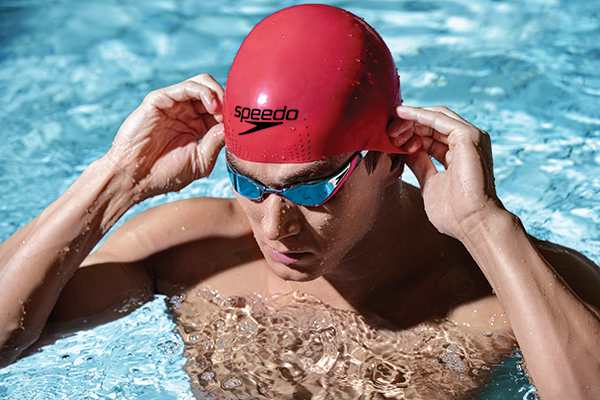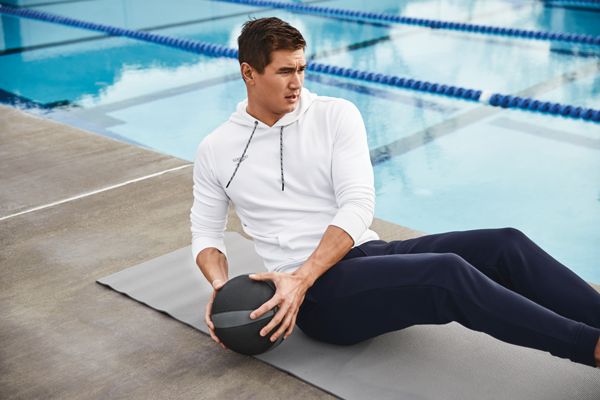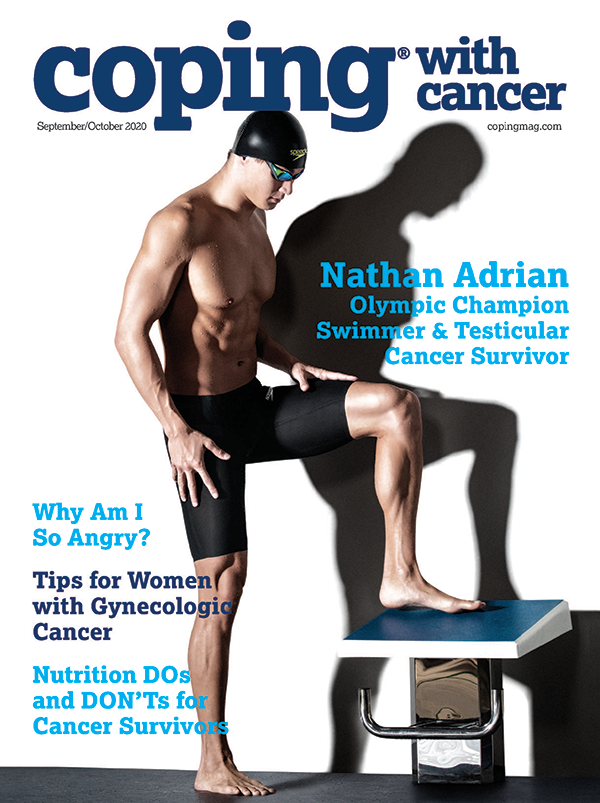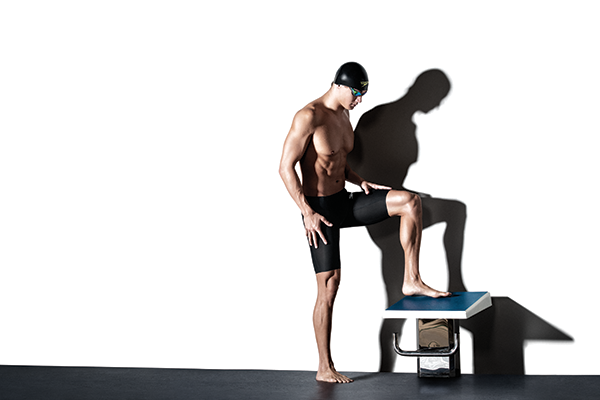Olympic Champion Swimmer Nathan Adrian
On Battling Testicular Cancer and Breaking the Stigma
by Kaylene Isherwood
Five-time Olympic gold medalist Nathan Adrian is one of the most decorated U.S. swimmers of all time. With one silver and two bronze medals also to his name, he is surpassed by only six U.S. swimmers, male or female.
Having been a professional athlete for nearly 10 years, Nathan knows what it’s like to take on opponents as a premier sprint swimmer. But in December 2018, he found himself facing a different obstacle – cancer.
Receiving a shocking diagnosis
As a professional athlete, Nathan concedes that he is hyper aware of his body. When he noticed unusual swelling and hardness in his testicles that didn’t go away after about a week, Nathan knew he needed to see his doctor.
It was a good thing he listened to his body, because a few days later, Nathan was diagnosed with testicular cancer. Fortunately, the cancer was detected early, and he received a good prognosis.
“My reaction was a bit of everything when I was diagnosed – shock, sadness, anger, anxiety … ” Nathan says in a recent interview with Coping® magazine. “It isn’t very fair to try to bundle up all of the emotions that a cancer diagnosis induces into just one or two words.”
I don’t feel like any less of a man because I have one testicle.
Undergoing treatment and getting back in the pool
A week after being diagnosed, Nathan underwent an orchiectomy to take out the tumorous testicle. Then, about a month later, he had a second surgery to remove some lymph nodes. Though he currently has no evidence of ongoing disease, the Olympic swimmer will continue with an active surveillance regimen through the end of the year.
After surgery, Nathan couldn’t lift anything more than 15 pounds for over a month. He had to put his training on hold while he recovered.
“The first few days of recovery, I was just happy to be on my feet and walking around,” Nathan shares. However, as soon as he recovered from surgery, the dedicated athlete was back in the weight room.
“I think a lot of people talk about their ‘rock’ through difficult times. Working out was one of my rocks. It helped ground me. One of the things I would encourage people to do (whether or not they get sick) is to identify their ‘rocks.’ That way when a difficult time arises they can go back to that thing that helps them clear their mind and feel refreshed,” Nathan says.

By late February, Nathan had made his return to the pool to begin training for the World Championships. Just seven months after his diagnosis, Nathan competed at the 2019 FINA World Championships. In an emotional victory, he anchored Team USA in the 4x100m freestyle relay. The team not only won gold but also set a new championship record time.
“I definitely feel like going through testicular cancer has helped my mental game in the pool,” Nathan says. “I still can flip on the intensity switch when necessary. However, I think I am a bit more forgiving of myself if I have a bad day in practice or a bad race. We just don’t have enough time on this earth to allow our days to be ruined by something like that.”
Going public and finding support
Testicular cancer is something a lot of men don’t like to talk about. Nathan, however, chose to go public with his diagnosis, announcing the news on Instagram and Twitter, writing, “Life, like swimming the 100 free, can come at you hard and fast as you can’t always see who, or what, may be chasing you down… After a few tests and visits with a specialist, I unfortunately learned that I have Testicular Cancer.”
Over the next few months, Nathan publicly documented his cancer experience and urged other men to get screened. “I felt that it was important to talk about my journey with cancer on social media,” Nathan shares. “Because through all of this, I found comfort in others that shared their own journey online. It is extremely helpful to know that you are not alone. Others provided that for me, and through this, I was hop- ing to provide that for others as well.”
One such person whom Nathan found particularly inspiring is Justin Birckbichler, a testicular cancer survivor, men’s health activist, and founder of ABallsySenseofTumor.com. Nathan is an avid follower of Justin’s blog. [Editor’s Note: Read Justin’s story on Coping® at copingmag.com/testicular-cancer.]
What is more manly than facing your biggest fears head on? To all those men out there, I say this: Make health your priority.
Raising awareness and inspiring others
When Nathan isn’t training for his next meet, he’s raising awareness for testicular cancer and advocating for early screening. In his Instagram post announcing his diagnosis, Nathan wrote, “I hope to share my journey in an effort to help break the stigma of discussing men’s health issues. I’ve realized that too often we tend to avoid these important topics, ignore the potential warning signs, and put off getting the medical help that we may need.”
In November 2019, Nathan partnered with the Movember Foundation to share his story. In an inspiring video titled “No Less of a Man,” Nathan shares, “There is this huge stigma around testicular cancer. Men have this direct correlation equivocating their masculinity to having two testicles, i.e. ‘grow a pair.’ Well, I don’t have a pair anymore. I only have one. I think that the way to break that down is to do exactly what we’re doing right now and talking about it. I don’t feel like any less of a man because I have one testicle.”

Focusing on what he can control
Throughout his cancer journey and his swimming career, Nathan has learned that not everything is within his control. The important thing is to focus on what he can control. With cancer treatment behind him, Nathan now has his sights set on the Tokyo Olympics, which have been postponed until summer 2021 due to the coronavirus pandemic.
“There is nothing I can do to control a global pandemic,” Nathan concedes. “However, I can control my own reactions to the situation and work closely with my coach to make sure we are ready next year when the time comes again to compete for a spot on the Olympic Team.”
More from Our Conversation with Nathan
What advice would you give to Coping® readers who are facing cancer, especially testicular cancer?
I think the two things that come to mind are, one, take your health into your own hands. Be your own advocate, do lots of research, and ask lots of questions. Second opinions are never a bad thing. I will caution people, however, when spending too much time online on forums and listening to anecdotal stories from anonymous people online. I think support groups can be extremely helpful from an emotional standpoint and even to get your mind working as you formulate your questions for your doctors; however, true medical advice should be taken from medical providers and well researched publications.
Two, it is OK to be feeling emotions you have never felt before. If those emotions worry you, then talk to someone about it. If you don’t want
to talk to a friend or family member, ask your doctor for a referral for mental health services.
What would you tell other men who do feel like less of a man because of testicular cancer or who are worried about getting checked?
In this life, it is important to figure out what you can and cannot control. Once you HAVE cancer, you cannot control it anymore. What you CAN do about it is get checked and give yourself every fighting chance to treat it and move on. I understand the tendency to want to hide your head in the sand and pretend like there isn’t anything going on. I felt those urges myself. But what is more manly than facing your biggest fears head on? To all those men out there, I say this: Make health your priority.

You can keep up with Nathan Adrian by following him on Instagram and Twitter: @nathangadrian.
This article was published in Coping® with Cancer magazine, September/October 2020.


